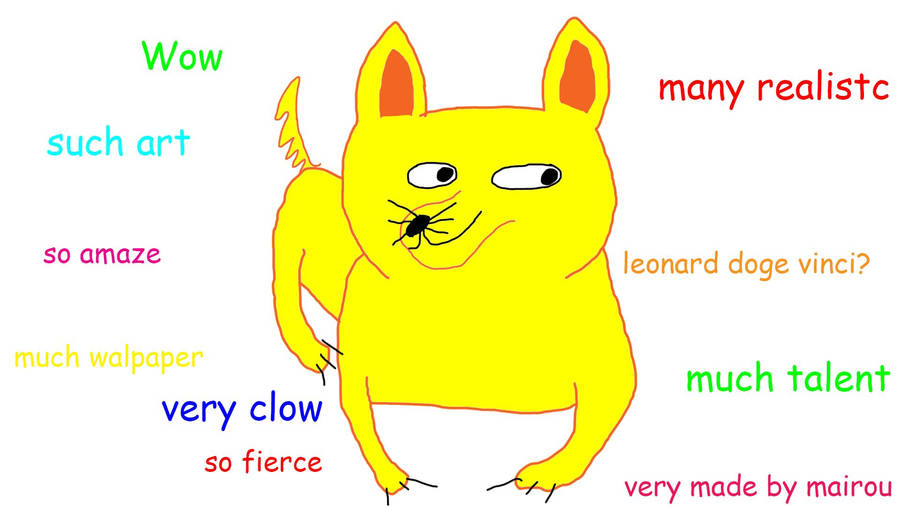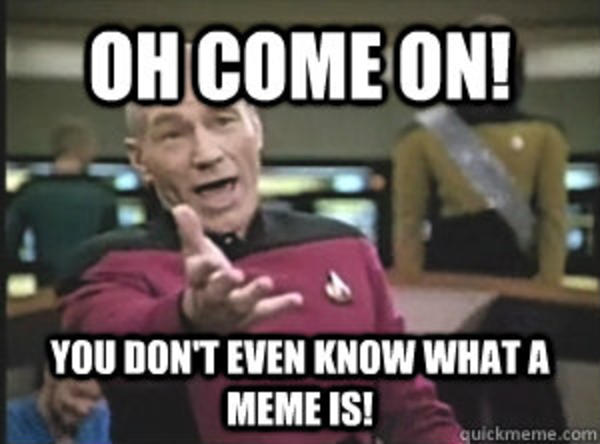
So far most comparisons of the rate of cultural evolution - relative to the evolution of DNA-based creatures - have failed to control for the shorter generation times of memes compared to their hosts. A failure to do this leaves open the possibility that cultural evolution is faster than mammal evolution simply because memes have shorter generation times than mammals do. This is a problem with
Charles Perreault's 2012 article on the topic, for example, as
I pointed out at the time.
John Wilkins laid down the gauntlet on this issue in 2009, here:
the speed of cultural evolution is pretty much the same as the speed of biological evolution. The problem is that the “rate” is not absolute. Speed in evolution is always relative to generations, not to years. I feel that cultural evolution will tend to be roughly the same relative rate as biological, if only because error rates tend to be at or about the same general level in transmission processes.
However, intuitively it seems as though cultural evolution has led to nuclear power and moon landings in a short period of time - while organic evolution stumbled around for billions of years without doing these things. It seems as though empirically, cultural evolution really is faster, contra-Wilkins.
There's no shortage of theoretical candidates that hope to explain why cultural evolution is faster. In cultural evolution, mutations take place in brains, rather than cells. Variation can arise as a result of intelligent design, using interpolation and extrapolation. Evaluation can be performed under simulation. If you consider brains as containing Darwinian or quasi-Darwinian processes then the generation time there is even faster than cultural generation times - faster even than bacterial generation times.
One of my favorite candidates for a factor that explains the increased speed of cultural evolution involves the distinction between supervised learning and reinforcement learning. In supervised learning, mistakes are corrected by a supervisor, that presents the correct solution. A common alternative to this is reinforcement learning - where actions are scored by a reward function or a utility function. Mistakes are scored, but not corrected.
In organic evolution, organisms are mostly scored - in terms of reproductive success. However, bad quality actions are mostly not corrected. Supervised learning is associated with having a brain. Once you have a nervous system you can often learn using supervised learning. An important function of the brain is predicting consequences of actions - and the most common case of supervised learning involves predicting future sensory inputs. Here, after predictions relating to future sensory inputs are made, sensory inputs are actually received. The predicted and actual perceptions can be compared and supervised learning techniques can be used to correct any mistakes. Though there's no actual supervising agent, this qualifies as supervised learning - since the correct output is presented to the learner on every timestep.
Where does culture come in? Culture makes individual learning add up over the lifetimes of multiple individuals. Without culture, learned information is lost when the individual dies and their brain is eaten by worms. In principle, learned information can still get into the germ line via the Baldwin effect - but that is still a pretty slow process. With cultural transmission, information acquired using supervised learning can directly be passed down the generations and it can accumulate over time.
I won't lay out the case here for supervised learning being faster and better than reinforcement learning - that's part of machine learning folklore.
At first glance, this seems like an argument for psychological evolution being faster than DNA evolution. After all, brains have been around for 500 million years or so. They aren't a new phenomenon. So, how can supervised learning explain how it is only cultural evolution that seems faster? The idea is that psychological evolution is also faster, but that until the origin of culture, it couldn't really go anywhere. Without culture, information in brains is obliterated in every generation and can't really accumulate. As I mentioned, it can still affect evolutionary rates - via the Baldwin effect. No doubt the Baldwin effect does speed up evolution - but it does not do so as much as cultural transmission does.
I think these observations help to address some criticisms of cultural evolution. For example, here's Massimo:
The conclusion that biological and cultural evolution are different also nicely accounts for the fact that cultural evolution is so much more dynamic (it happens much faster) and unpredictable than its biological counterpart. If we think of both as instances of Darwinism that difference becomes more puzzling.
To start with, this is a bit of a straw man, practically nobody is saying that cultural evolution and biological evolution are exactly the same (excepting maybe Ben Cullen).
Anyway, according to the idea described on this page, one of the most significant differences is explained by learning theory - it is supervised learning. The impact of this on evolution dates back 500 million years or so - to the origin of brains. However before culture got started, its influence on the evolutionary process was somewhat muted - due to the regular destruction of information in brains in every generation.
Supervised learning represents a type of feedback from outcomes to the production of new variants to test. In the context of evolutionary theory, this is somewhat similar to Lamarckian inheritance: the inheritance of acquired characteristics. It is however important to note that this is not really a new effect - it dates back 500 million years. Nor can one say that such evolution is not "Darwinian" - since Darwin was an enthusiast for such feedbacks. Indeed, he promoted a theory of "gemmules" which featured feedback from somatic cells to the germ line. What we can say is that cultural evolution is not Weismannian. It features non-selective feedback from the phenotype to the genotype. However, we must also note that evolution in the organic realm is not really Weismannian either. Weismannian evolution - in which phenotypes only affect genotypes via selection and mate choice - was a product of Weismannian's choice of traits. He cut the tails off rats - and observed that this 'acquired characteristic' was not inherited. If Weismann had looked at rat fleas of rat pox instead he might have drawn the opposite conclusion - that acquired characteristics were inherited.
In computer science, lack of access to supervised learning helps to explain the limitations of genetic algorithms and genetic programming - and helps to explain why memetic algorithms are needed.
 I've criticized those who focus on norms before - but reading some recent literature makes me aware that I need to present a more specific critique.
I've criticized those who focus on norms before - but reading some recent literature makes me aware that I need to present a more specific critique. I have a whole chapter about memetic immunity in my 2011 book on memetics. There's a brief summary on my
I have a whole chapter about memetic immunity in my 2011 book on memetics. There's a brief summary on my  In 2014 I declared:
In 2014 I declared:  I've long supported the idea of
I've long supported the idea of 

 So far most comparisons of the rate of cultural evolution - relative to the evolution of DNA-based creatures - have failed to control for the shorter generation times of memes compared to their hosts. A failure to do this leaves open the possibility that cultural evolution is faster than mammal evolution simply because memes have shorter generation times than mammals do. This is a problem with
So far most comparisons of the rate of cultural evolution - relative to the evolution of DNA-based creatures - have failed to control for the shorter generation times of memes compared to their hosts. A failure to do this leaves open the possibility that cultural evolution is faster than mammal evolution simply because memes have shorter generation times than mammals do. This is a problem with  Joe Brewer once
Joe Brewer once 








